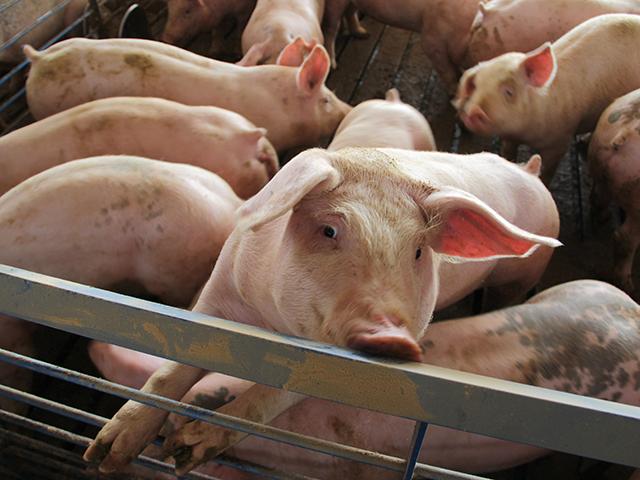13 States Join Animal Law Fight
States Join Farms, Food Companies in Lawsuit Aimed at Stopping Massachusetts Animal Law
LINCOLN, Neb. (DTN) -- Thirteen states have entered the fight against a Massachusetts animal welfare law requiring farms to meet minimum animal housing size requirements to sell pork products.
The states filed an amicus brief with a federal court in support of food companies and farms in an ongoing lawsuit against the Prevention of Farm Animal Cruelty Act. The law came about after Massachusetts voters supported the 2016 ballot initiative Question 3.
The law took effect in June 2022 and on the heels of a Supreme Court ruling that upheld California's Proposition 12, a group of farms, food and processing companies in July 2023 asked a federal court in Massachusetts to halt the law.
The farms and pork processors filing legal action include Triumph Foods LLC, Christensen Farms Midwest LLC, The Hanor Company of Wisconsin LLC, New Fashion Pork LLC, Eichelberger Farms Inc. and Allied Producers' Cooperative.
In an amicus brief filed Tuesday, the 13 states said the Massachusetts law would be akin to Iowa voters passing a law dictating how fish are to be treated in Atlantic Coast states.
"Suppose Iowa voters began to worry about overfishing and the inhumane harvesting of Atlantic shellfish," the states said in the brief.
"So, the Iowa legislature passes a law about how lobsters, clams and steamers must be harvested to be lawfully sold in the state. That is no different from the current approach of some states that do not raise hogs trying to impose unworkable restrictions in states that do. And while consumers in the regulating states will pay higher prices as a result, the economic implications are far greater -- and more troubling."
Signing on to the amicus brief are attorneys general from Iowa, Louisiana, Mississippi, Missouri, Montana, Nebraska, New Hampshire, North Dakota, Oklahoma, South Carolina, South Dakota, Utah and Wyoming.
Massachusetts's law makes it illegal to sell whole pork meat in the state if it comes from farms where animals were "confined in a cruel manner."
NATIONAL EFFECTS
While the law facially appears to regulate just the sales of pork in Massachusetts, the 13 states said it has a much broader effect on farms and companies across the country.
P[L1] D[0x0] M[300x250] OOP[F] ADUNIT[] T[]
"Question 3's application and accompanying regulations will deny market access to out-of-state pork farmers and processors unless their farming practices comply with Massachusetts's dictates," the brief said.
"Beyond Iowa, hog farmers are critical to many states' economies. Massachusetts Question 3 will disrupt the pork industry by imposing stringent requirements inconsistent with industry practices on hog farmers and pork processors across the country. Those mandates will substantially burden the interstate pork market and increase the price of pork for all Americans."
The states point to Iowa's pork industry to show what they say could be an economic hit to states as a whole from the law.
In 2020, Iowa's pork industry contributed about $40.8 billion to the state's economy, according to the filed brief. Iowa had 5,400 pig farms and housed about one-third of all hogs in the U.S.
"Contrast Iowa with Massachusetts, which purchases nearly all pork sold within its borders from other states," the brief said.
"Its residents annually consume 396 million pounds of pork but produce only 1.9 million in state. Thus, Massachusetts produces less than one-half of 1% of the pork it eats. Yet Question 3 directs pork-producing states to reorganize their industries based on the 'moral' sensibilities of its voters."
SMALL PRODUCERS HURT
The states said as is the case with Proposition 12, the Massachusetts law will hurt small, independent hog producers the most because of the costs to comply.
"The potential financial effect on farmers will increase if other states impose similar unworkable regulations with their own idiosyncrasies inconsistent with those in Massachusetts," the states said in the brief.
"For example, farmers in Iowa could invest millions of dollars to remodel their hog farms to comply with Massachusetts's requirements only to find New York enacting a law imposing larger housing requirements per pig."
The states said the Massachusetts law violates the import-export clause and the full-faith-and-credit clause of the Constitution. The import-export clause states, "No state shall, without consent of the congress, lay any imposts or duties on imports or exports, except what may be absolutely necessary for executing its inspection laws."
The full-faith-and-credit clause prevents states from adopting policies of "hostility to the public acts" of other states.
Though the legal issues raised are virtually identical, the potential market effects from the Massachusetts law are not as far-reaching as with Proposition 12.
California accounts for about 13% of all pork consumption in the U.S., at 2.7 billion pounds annually, whereas Massachusetts consumes about 2% of all U.S. pork.
Though the Massachusetts law likely affects a smaller segment of all U.S. pork producers than Proposition 12, the farms filing the lawsuit argue the act violates the Constitution by regulating farms in other states.
In fact, when Massachusetts voters approved Question 3 in November 2016, not a single gestation crate was used by hog producers in the state -- meaning the law applies to farms outside the state's borders.
The farms and businesses that sued Massachusetts said in the lawsuit they are unable to keep up with the production of compliant pork demand for both Massachusetts and California.
Read more on DTN:
"Farms Launch Legal Fight Over Hog Welfare Law," https://www.dtnpf.com/…
Todd Neeley can be reached at todd.neeley@dtn.com
Follow him on X, formerly known as Twitter, @DTNeeley
(c) Copyright 2023 DTN, LLC. All rights reserved.





